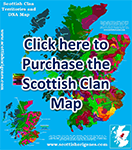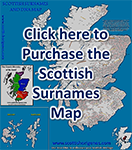You are here
The Science of Scottish Surnames
 When one thinks of Scottish surnames, one almost always thinks of those that begin with Mc’ or Mac.’ This is an over simplification as Scottish surnames are quite diverse and reflect the various population migrations that included Irish tribes, Vikings, Anglo-Saxons, and Normans, not forgetting the contribution of the native Picts. Surnames in Great Britain can usually be classified as follows;
When one thinks of Scottish surnames, one almost always thinks of those that begin with Mc’ or Mac.’ This is an over simplification as Scottish surnames are quite diverse and reflect the various population migrations that included Irish tribes, Vikings, Anglo-Saxons, and Normans, not forgetting the contribution of the native Picts. Surnames in Great Britain can usually be classified as follows;
- Patronyms; are a component of a personal name based on the name of one's father, grandfather or an even earlier male ancestor. (‘son of. . .’): Bateson, Jeffreys, Watson, MacGregor (Scottish- ‘son of Gregor.’
- Some patronyms denote group membership: Haldane (‘half-Dane’); Wallace (‘a Celt’)
- Occupations or status: Fisher (fisherman); Wright (maker of machinery or objects); Franklin (feudal status term).
- Specific places: Charlesworth (Derbyshire, England), Darlington (Co. Durham, England), Crick (Northamptonshire, England),
- Landscape features that reflected where ones ancestor lived: Bridges; Ford (river crossing); Southern
- Nicknames or characteristics: Darwin (‘dear friend’); Hodgkin (pet form of Roger); Short, Tall, Black, Brown.
Patronyms (denoted by Mc/Mac’) constitute a significant minority of surnames found in Scotland. This may simply reflect the fact that the ancient Picts appear to  have adopted the customs of the arriving Irish tribes. Since science has demonstrated that many, if not all of the Irish Clans had a single founding ancestor this could potentially apply to Scottish surnames particularly those beginning with Mc/Mac. Given the fact that even Lowlander Scottish families seem to have adopted the Clan system this ‘one man one Clan’ hypothesis may well ring true for Scotland as a whole and for many Scottish surnames, be they Highlander, Lowlander, Gael or Saxon. However one drawback is that Patronyms when based on common personal names like Donald, may have given rise to unrelated Clans using similar surnames and found in different areas of Scotland. So for example if your surname is McDonald you may be left wondering which Clan your ancestors belonged to. Here too DNA can provide the answer. This is because the surnames of one’s medieval MacDonald ancestors neighbours are reflected in your DNA matches, so that if your ancestor was a MacDonald from the Isle of Skye then matches will occur to surnames like MacLeod and MacKinnon, while an ancestor from the MacDonald’s of Glencoe will match Stewart’s or Menzies.
have adopted the customs of the arriving Irish tribes. Since science has demonstrated that many, if not all of the Irish Clans had a single founding ancestor this could potentially apply to Scottish surnames particularly those beginning with Mc/Mac. Given the fact that even Lowlander Scottish families seem to have adopted the Clan system this ‘one man one Clan’ hypothesis may well ring true for Scotland as a whole and for many Scottish surnames, be they Highlander, Lowlander, Gael or Saxon. However one drawback is that Patronyms when based on common personal names like Donald, may have given rise to unrelated Clans using similar surnames and found in different areas of Scotland. So for example if your surname is McDonald you may be left wondering which Clan your ancestors belonged to. Here too DNA can provide the answer. This is because the surnames of one’s medieval MacDonald ancestors neighbours are reflected in your DNA matches, so that if your ancestor was a MacDonald from the Isle of Skye then matches will occur to surnames like MacLeod and MacKinnon, while an ancestor from the MacDonald’s of Glencoe will match Stewart’s or Menzies.
So is there any evidence to support the one man one clan hypothesis in Scotland? At present the answer is NO, until scientific studies like those by MacEvoy et al., are done for Scottish surnames we will not know the answer. But having said that Scotland is exceptionally lucky in that the ‘Clan Territories of Scotland’ are exceptionally  well documented which facilitates the process of using one’s DNA results to pinpoint an ancestor to a specific area. And it is because of this that I have been able to pinpoint the Scottish Genetic Homeland of 3 individuals who had no idea of their medieval or in some cases even their Scottish ancestry. One Case Study that shows the process working for a person with a Highlander Scottish background, but there are 2 others showing the process working for contrasting Lowlander Scots, one border Reiver and another from the Viking-Gaels of Galloway. (click here to view Case Studies).
well documented which facilitates the process of using one’s DNA results to pinpoint an ancestor to a specific area. And it is because of this that I have been able to pinpoint the Scottish Genetic Homeland of 3 individuals who had no idea of their medieval or in some cases even their Scottish ancestry. One Case Study that shows the process working for a person with a Highlander Scottish background, but there are 2 others showing the process working for contrasting Lowlander Scots, one border Reiver and another from the Viking-Gaels of Galloway. (click here to view Case Studies).
And remember if your ancestors lived in a pinpointed area over 1,000 years ago when surnames became common, then they were most likely there prior to leaving for towns and cities across the world, and your distant relatives probably still live there even today. That’s the beauty of this approach, once you pinpoint a ‘Genetic Homeland’ you can prove it by DNA testing people with your surname in the pinpointed area.






